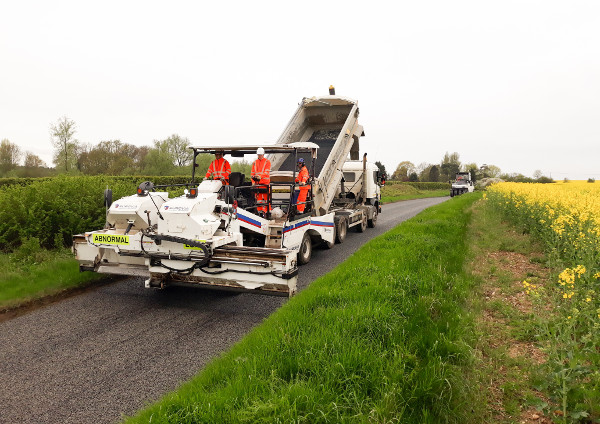Ringway Jacobs is utilising new technology on the Transport for Buckinghamshire’s road surfacing programme for 2019 – 20.
The strategic partnership between the two organisations and now celebrating its tenth year of collaboration and shows no signs of slowing down, especially on its transport services work for Buckinghamshire County Council.

Ringway Jacobs - working in partnership with Eurovia Specialist Treatments, the contractor responsible for the surface-dressing programme - has employed a new innovation: The Etnyre Chipper Spreader will be used for all 27 surface dressing sites in Buckinghamshire. The total area to be surface dressed is 238,314 m2.
Having discovered the benefits on their Essex Highways contract over the last two years, Ringway Jacobs brought the technology to Buckinghamshire, in order for their client to reap similar results.
Buckinghamshire’s road surfacing programme is now in full swing; with a significant proportion of its work taking place during the school holidays, when the roads are at their quietest, in order to reduce disruption.
Benefits
Two Etnyre Chipping Spreaders will complete the surface dressing programme in Buckinghamshire over the summer months. The main function of the Etnyre is to uniformly distribute aggregate into the hot liquid bitumen emulsion, with efficiency savings realised by the reduction in both waste material and time on site.
The Etnyre Chipper Spreader’s on-board computer can manage the rate of spread of the chippings, to improve material usage and therefore eliminate waste material. The computer varies the gate opening to maintain a pre-set application rate, regardless of the chipper spreader speed.
It is designed to accurately and efficiently apply a controlled amount of aggregate to the road, in the chip seal process. The flow of chip application is automatically controlled as the ground speed increases or decreases.
The Etnyre Chip Spreaders achieve these results using a hydrostatic drive system and a variable width spread hopper to apply multiple aggregate sizes and application rates, over a full range of travel speeds and spreading widths.
Of particular benefit on the rural roads of Buckinghamshire, is the machine's ability to vary the width of the spreader hopper – with the capability to change the width of application while in operation.
It has the capacity to spread the aggregate up to 6.1m, meaning that the majority of the more minor and rural roads can now be treated in one pass.
In terms of efficiency, this 30% increase in the maximum width is providing a minimum of 30% increase in time saved when undertaking the works, with the added benefit of reducing disruption to the travelling public.
Savings of between 5% and 10% in aggregate consumption can also be achieved, due to a lack of overlap on previous longitudinal joints.
Safety is another major benefit, due to sites being completed in one pass as the machine is laying at up to 6m wide the carriageway has to be closed. This means that traffic cannot pass through, which creates a much safer workplace for the operatives and local public alike.
In Essex Highways, a 20% reduction in third party claims from members of the public, has been achieved, due to no exposure of binder on joints which can stick to motorist’s tyres.
Mike O’Neill, managing director of Ringway Jacobs said: 'At Ringway Jacobs, we and our shareholder, Eurovia, are encouraging all of our clients to utilise this technology on their surface dressing sites to generate savings. As an organisation we are committed to providing value for money for our local authority clients in Buckinghamshire, Central Bedfordshire, Essex, Cheshire East and London, and having access to technology such as the Etnyre Chip Spreader offers a great solution for this type of treatment.
'Eurovia Specialist Treatments has just two crews in the country that use these machines and Ringway Jacobs is delighted to have secured this innovative technique on all 27 of the surface dressing sites in Buckinghamshire.'
Deputy leader and cabinet member for transportation in Buckinghamshire, Mark Shaw said: 'The use of this exciting technology is great news for us.
'Putting surface dressing down in one clean sweep will reduce the time on site, but more importantly, no joints means a more robust finish, less prone to failure, improving value for money for us. I am really pleased this is something we have secured for use in Buckinghamshire this year.'





